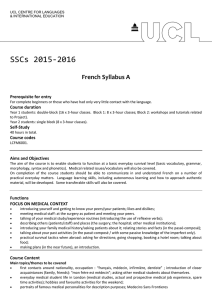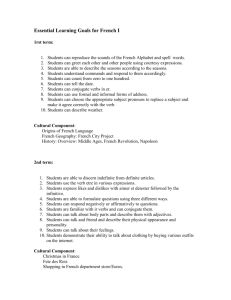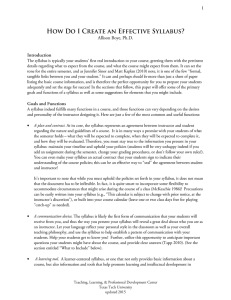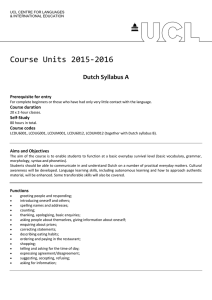Course Units 2015-2016 French Syllabus A Prerequisite for entry Course duration
advertisement
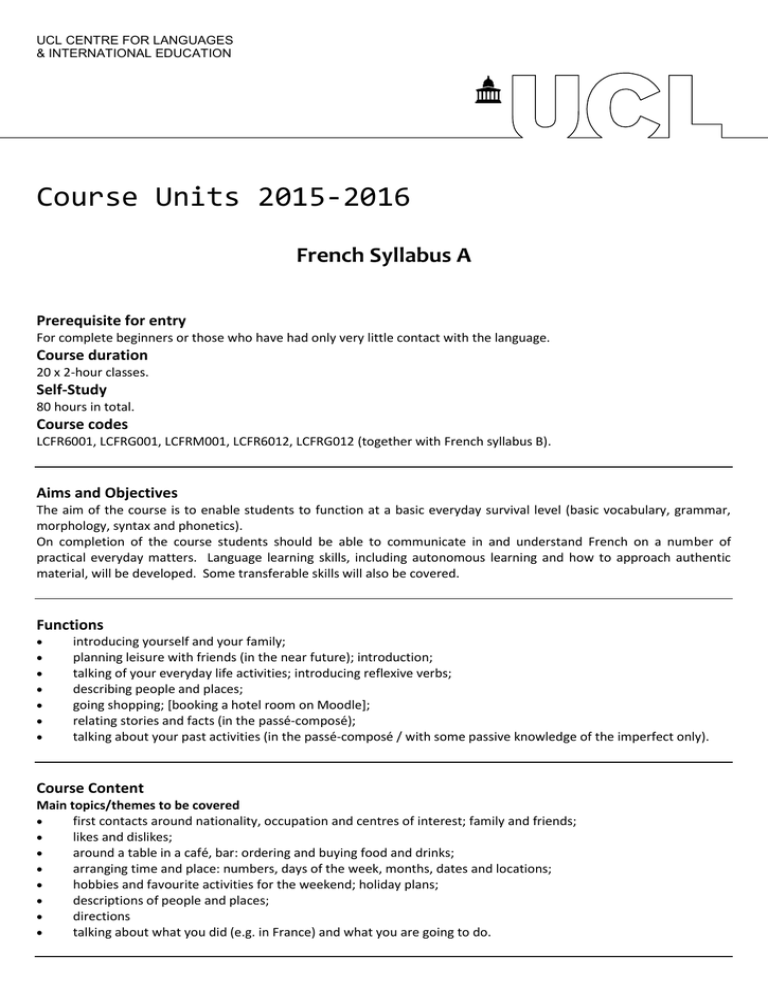
UCL CENTRE FOR LANGUAGES & INTERNATIONAL EDUCATION Course Units 2015-2016 French Syllabus A Prerequisite for entry For complete beginners or those who have had only very little contact with the language. Course duration 20 x 2-hour classes. Self-Study 80 hours in total. Course codes LCFR6001, LCFRG001, LCFRM001, LCFR6012, LCFRG012 (together with French syllabus B). Aims and Objectives The aim of the course is to enable students to function at a basic everyday survival level (basic vocabulary, grammar, morphology, syntax and phonetics). On completion of the course students should be able to communicate in and understand French on a number of practical everyday matters. Language learning skills, including autonomous learning and how to approach authentic material, will be developed. Some transferable skills will also be covered. Functions introducing yourself and your family; planning leisure with friends (in the near future); introduction; talking of your everyday life activities; introducing reflexive verbs; describing people and places; going shopping; [booking a hotel room on Moodle]; relating stories and facts (in the passé-composé); talking about your past activities (in the passé-composé / with some passive knowledge of the imperfect only). Course Content Main topics/themes to be covered first contacts around nationality, occupation and centres of interest; family and friends; likes and dislikes; around a table in a café, bar: ordering and buying food and drinks; arranging time and place: numbers, days of the week, months, dates and locations; hobbies and favourite activities for the weekend; holiday plans; descriptions of people and places; directions talking about what you did (e.g. in France) and what you are going to do. Skills Reading reading for gist and scanning for specific descriptive information; reading basic narrations; short articles; Writing personal presentation; portrait of themselves and others / people and places; describing situations; practising different formats: touristic brochure, interview, film review…) Linguistic Structures Phonetics basic rules of the pronunciation of spoken French. Grammar gender and number of French nouns: the corresponding use of definite and indefinite articles; present tense of regular verbs in -er and of the verbs “être” and “avoir”; basic interrogative and negative structures; present tense and the structure of the irregular verbs (aller, faire, venir, prendre, vouloir, pouvoir, devoir) when followed by another infinitive verb: when to use “de” between two verbs; introduction of the near future based on aller + infinitive; adverbs and prepositions referring to place (aller à ) and activity (faire de); ‘‘de’’ as a partitive article (de la, du, des) and the negation of the partitive indefinite article (pas de + no indefinite article + noun); [On Moodle : passive knowledge of direct pronouns (le, la, les before verbs without prepositions e.g. je le vois) and indirect pronouns]; basic knowledge of imperative mode; demonstrative adjectives (ce, cette, cet, ces) and possessive adjectives (mon, ma, mes…); reflexive verbs (se verbs; essentially about habits); agreement in gender and number of the adjectives in descriptions; past tenses: the active use of the passé-composé and the passive knowledge of the imperfect for “être” and “avoir”. Learning Resources Syllabus A Course Book Le Nouveau Taxi 1, Guy Chapelle, Robert Menand (Hachette) – ISBN 9782011555489 Syllabus A Zero Credit Course Book Palgrave French 1 – Second edition including 2 audio CDs (Palgrave Macmillan) – ISBN : 9780230553040 Bilingual Dictionary – Pocket Edition (Collins/Roberts) Syllabus A/B Course Books Nouveau Taxi 1, Textbook, Guy Chapelle, Robert Menand (Hachette) – ISBN : 97820111555489 Alter Ego + (A1) – Textbook (ISBN : 9782011558107) and Workbook (ISBN : 9782011558114) Bilingual Dictionary – Pocket Edition (Collins/Roberts) A selection of authentic material will also be used. In addition there is a wide range of language learning materials available for self-study in the Self-Access Centre.
